There are many so-called “new waves” in film history, from the French nouvelle vague (1959 through the middle 1960s) to the present day. While such monikers serve many purposes, including facilitating international marketing , they do identify those regions where, for any number of reasons, particularly fertile and original bodies of creative work have emerged.
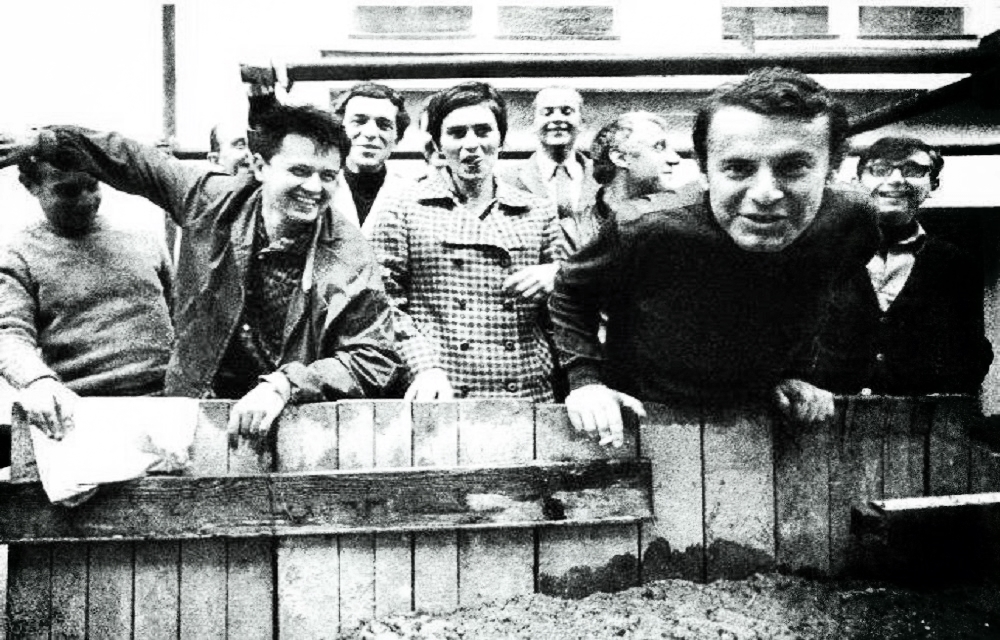
Pictured (left to right): Czech directors Ivan Passer, Jan Němec, Pavel Juráček, Věra Chytilová, Evald Schorm, Miloš Forman and Jiří Menzel
Beginning around 1963 and continuing through the “Prague Spring” of 1968, one of the most vibrant and unusual of these “waves” rolled through Czechoslovakia. Stalin’s death in 1953 and the emerging thaw in east central European politics had led to a steady decline in Socialist Realist filmmaking and the gradual emergence in the 1960s of new and unconventional artistic voices in Poland, Hungary, Yugoslavia, and Czechoslovakia. Characterized to some degree by a subtle mixing of fiction and documentary, the Czech “school” enjoyed perhaps the most unprecedented degree of freedom, up until the arrival of the Soviet tanks in August 1968. It includes among its highlights classic films by Ivan Passer, Milos Forman, Jiri Menzel, and Jan Kadar.
The seeming mystery of this veritable miracle within the confines of a totalitarian state is easily explainable. The more cultured comrades who became responsible for the film industry in the sixties simply ‘forgot’ that Lenin saw film solely as a propaganda tool, and made the ‘mistake’ of viewing it as an art form. Retaining the organizational structure of the industry which had been designed for the production of propaganda, they used its bottomless financial resources to fund artistic probes into the situation of man on this earth. State ownership of the industry can, indeed, be ideal, as Milos Forman once said, provided that the state, or at least its film agency, is run by philosophers. – Josef Skvorecky
The films of the Czech New Wave formed a movement not because they shared stylistic concerns, but rather because they were a response to the historical and political reality of Czechoslovakia following the 1960s reforms. So, Vera Chytilova’s formally radical and non-narrative film Daisies (Sedmikrasky, 1966) is aligned with the literary lyricism of Jiri Menzel’s Capricious Summer (Rozmarne leto, 1968), and the blunt realism of Frantisek Vlacil’s Adelheid (1969) not because they share style or content but because they carry on a joint dialogue with a post-totalitarian political conscience.
Many of the classics of the Czech New Wave, including Loves of a Blond, Closely Watched Trains, and The Shop on Main Street, as well as such exemplary films as Menzel’s Larks on a String (Skrivanci na nitich), Jan Nemec’s Diamonds of the Night (Demanty noci), A Report on the Party and Its Guests (O slavnosti a kostech), Vera Chytilova’s Daisies, Jaromil Jires’s The Joke (Zert), Menzel’s Capricious Summer, Frantisek Vlacil’s Adelheid, and Odrich Lipsky’s Lemonade Joe (Limonadovy Joe).
In the summer of ‘68, the Soviets came rolling into Prague, unseated Dubcek and imposed the most draconian social and political regulations since the Stalin era, which in effect “officially” ended the Czech New Wave. Such was the dramatic finale for the 1960s film generation.
Ten Czechoslovak Directors
The following are ten film directors whose achievements contributed significantly to the success of the Czechoslovak New Wave.
Vera Chytilova (1929 – 2014)
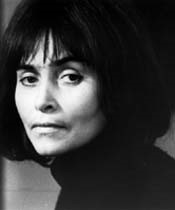 A former draftswoman, photograph retoucher, script girl and fashion model, Vera Chytilova attended FAMU in the late Fifties with several other future Czechoslovak New Wave luminaries. Her graduation film, The Ceiling (Strop, 1961), received distribution in Czechoslovakia in tandem with her second film, A Bag of Fleas (Pytel blech, 1962). Both shorts – and her debut feature, Something Else (O necem jinem, 1963) – were heavily influenced by French and American cineme verite traditions and utilized documentary techniques in the telling of fictional stories. Despite the challenging content of her early work, it paled next to the radical innovation employed in her next film, Daisies (Sedmikrasky, 1966). A fractured, giddily surrealistic portrayal of two bored, self-indulgent young women and their destructive antics, Daisies utilized all manner of collage and expressionistic technique and revealed Chytilova to be a bold stylist and cinematic subversive. Daisies was immediately banned by the Czech government until 1967, when it was released to worldwide critical acclaim. Chytilova’s name suddenly became synonymous with the more formally experimental wing of the Czechoslovak New Wave, an association she affirmed with her tremendously unusual follow-up, The Fruits of Paradise (Ovoce stromi rajskych jime, 1969). After the Soviet overthrow of the Dubcek regime in August 1968, Chytilova was forbidden by the government to make films. When the ban was lifted in 1975, she returned to filmmaking with The Apple Game (Hra o jablko, 1976) and directed films in the Czech Republic until her death in 2014.
A former draftswoman, photograph retoucher, script girl and fashion model, Vera Chytilova attended FAMU in the late Fifties with several other future Czechoslovak New Wave luminaries. Her graduation film, The Ceiling (Strop, 1961), received distribution in Czechoslovakia in tandem with her second film, A Bag of Fleas (Pytel blech, 1962). Both shorts – and her debut feature, Something Else (O necem jinem, 1963) – were heavily influenced by French and American cineme verite traditions and utilized documentary techniques in the telling of fictional stories. Despite the challenging content of her early work, it paled next to the radical innovation employed in her next film, Daisies (Sedmikrasky, 1966). A fractured, giddily surrealistic portrayal of two bored, self-indulgent young women and their destructive antics, Daisies utilized all manner of collage and expressionistic technique and revealed Chytilova to be a bold stylist and cinematic subversive. Daisies was immediately banned by the Czech government until 1967, when it was released to worldwide critical acclaim. Chytilova’s name suddenly became synonymous with the more formally experimental wing of the Czechoslovak New Wave, an association she affirmed with her tremendously unusual follow-up, The Fruits of Paradise (Ovoce stromi rajskych jime, 1969). After the Soviet overthrow of the Dubcek regime in August 1968, Chytilova was forbidden by the government to make films. When the ban was lifted in 1975, she returned to filmmaking with The Apple Game (Hra o jablko, 1976) and directed films in the Czech Republic until her death in 2014.
Milos Forman (1932 – 2018)
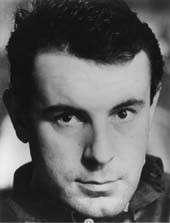 The most internationally famous director to emerge from the Czech New Wave was Milos Forman. Orphaned by the Nazis during the Occupation, Forman was raised by a succession of uncles before attending FAMU for scriptwriting (having failed to gain entry into drama school). After graduating in 1957, Forman worked in various positions in the Czech film industry before making his screen debut in 1963 with Competition (Konkurs) and If There Were No Music (Kdyby ty muziky nebyly), shown jointly under the title Competition. The distinctive Forman style—a canny mixture of black humor and painstaking observation of everyday life—was evident from the beginning. This signature style came to fruition in Forman’s first feature Black Peter (Cerny Petr, 1963), a cinema verite-style social satire about generational conflict, shot on location with non-actors. Black Peter won the Czech Film Critics Prize and was followed by the internationally acclaimed Loves of a Blonde (Lasky jedne plavovlasky, 1965), which was awarded an Oscar nomination for Best Foreign Film in 1966. A bittersweet behavioral study of loneliness and desire, Loves of a Blonde was soon hailed as a definitive film of the Czechoslovak New Wave, celebrated around the world for its lovingly detailed depiction of human incidents that are at once unique and representative of larger society. Forman’s next film was the more overtly political Firemen’s Ball (Hori, ma panenko!, 1967), a thinly-veiled satire of the Czech government that was temporarily banned by President Novotny. Also an Academy Award nominee, Firemen’s Ball was to be Forman’s last film in Czechoslovakia. When Russian tanks rolled into Prague in 1968, Forman was forced to leave Czechoslovakia for the United States, where he has lived and worked ever since, directing such notable films as Taking Off (1971), One Flew Over the Cuckoo’s Nest (1975), Ragtime (1981), Amadeus (1984), and, most recently, Man on the Moon (1999).
The most internationally famous director to emerge from the Czech New Wave was Milos Forman. Orphaned by the Nazis during the Occupation, Forman was raised by a succession of uncles before attending FAMU for scriptwriting (having failed to gain entry into drama school). After graduating in 1957, Forman worked in various positions in the Czech film industry before making his screen debut in 1963 with Competition (Konkurs) and If There Were No Music (Kdyby ty muziky nebyly), shown jointly under the title Competition. The distinctive Forman style—a canny mixture of black humor and painstaking observation of everyday life—was evident from the beginning. This signature style came to fruition in Forman’s first feature Black Peter (Cerny Petr, 1963), a cinema verite-style social satire about generational conflict, shot on location with non-actors. Black Peter won the Czech Film Critics Prize and was followed by the internationally acclaimed Loves of a Blonde (Lasky jedne plavovlasky, 1965), which was awarded an Oscar nomination for Best Foreign Film in 1966. A bittersweet behavioral study of loneliness and desire, Loves of a Blonde was soon hailed as a definitive film of the Czechoslovak New Wave, celebrated around the world for its lovingly detailed depiction of human incidents that are at once unique and representative of larger society. Forman’s next film was the more overtly political Firemen’s Ball (Hori, ma panenko!, 1967), a thinly-veiled satire of the Czech government that was temporarily banned by President Novotny. Also an Academy Award nominee, Firemen’s Ball was to be Forman’s last film in Czechoslovakia. When Russian tanks rolled into Prague in 1968, Forman was forced to leave Czechoslovakia for the United States, where he has lived and worked ever since, directing such notable films as Taking Off (1971), One Flew Over the Cuckoo’s Nest (1975), Ragtime (1981), Amadeus (1984), and, most recently, Man on the Moon (1999).
Vojtech Jasny (1926 – 2019)
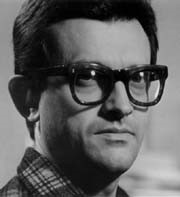 Unlike many “New Wave” movements, the Czech New Wave was not predicated on the rejection of the styles and attitudes of its cinematic forerunners. On the contrary, the “Czech Miracle” acknowledged, embraced, and often included those of prior generations. One such cinematic veteran who was instrumental in the creation and sustenance of the New Wave was Vojtech Jasny. A central figure in the “second generation” of Czech filmmakers (a group who flourished after the political thaw of 1956), Jasny has been described as the first Czech “auteurist” and the first to seek a specifically Czech film language. Jasny’s breakthrough production was September Nights (Zarijove Noci, 1957), a bold and open indictment of the Army that narrowly escaped a ban by the Minister for National Defense. September Nights was followed by Desire (Touha, 1958), a film-poem based on the parallel between the four season and the four periods of human life. Desire returned lyricism—long suppressed under Socialist Realism—to Czech film. Though Jasny was a progenitor of the Miracle generation, he soon became a participant as well. In his highly stylized fantasy Cassandra Cat (Az prijde kocour aka That Cat, 1963), Jasny further deviated from official neo-Stalinist aesthetic conventions, creating mix of modern fairy tale and political morality play that would win a Special Jury prize at Cannes and act as a catalyst for the burgeoning New Wave. Also a prizewinner at Cannes (for Best Director) was Jasny’s All My Countrymen (Vsichni dobri rodaci, 1968), arguably the most significant film of his career. Coming at the very end of the New Wave, All My Countrymen was a mournful testament to the inhabitants of a Moravian village who worked with Jasny for societal reform after the war.
Unlike many “New Wave” movements, the Czech New Wave was not predicated on the rejection of the styles and attitudes of its cinematic forerunners. On the contrary, the “Czech Miracle” acknowledged, embraced, and often included those of prior generations. One such cinematic veteran who was instrumental in the creation and sustenance of the New Wave was Vojtech Jasny. A central figure in the “second generation” of Czech filmmakers (a group who flourished after the political thaw of 1956), Jasny has been described as the first Czech “auteurist” and the first to seek a specifically Czech film language. Jasny’s breakthrough production was September Nights (Zarijove Noci, 1957), a bold and open indictment of the Army that narrowly escaped a ban by the Minister for National Defense. September Nights was followed by Desire (Touha, 1958), a film-poem based on the parallel between the four season and the four periods of human life. Desire returned lyricism—long suppressed under Socialist Realism—to Czech film. Though Jasny was a progenitor of the Miracle generation, he soon became a participant as well. In his highly stylized fantasy Cassandra Cat (Az prijde kocour aka That Cat, 1963), Jasny further deviated from official neo-Stalinist aesthetic conventions, creating mix of modern fairy tale and political morality play that would win a Special Jury prize at Cannes and act as a catalyst for the burgeoning New Wave. Also a prizewinner at Cannes (for Best Director) was Jasny’s All My Countrymen (Vsichni dobri rodaci, 1968), arguably the most significant film of his career. Coming at the very end of the New Wave, All My Countrymen was a mournful testament to the inhabitants of a Moravian village who worked with Jasny for societal reform after the war.
Jaromil Jires (1935 – 2001)
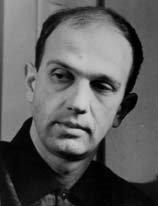 Jaromil Jires hit the Czechoslovak film scene with his FAMU thesis production The Hall of Lost Footsteps (Sal ztracenych kroku, 1958), a politically and formally daring work that immediately established him as a significant new talent. However, it was Jires’ film The Cry (Krik, 1963, aka The First Cry) that thrust him to the forefront of Czechoslovak cinema. One of the first films to definitively signal bold new happenings in Czechoslovak film (along with Uher’s Sunshine in a Net (Slnko v sieti, 1962) and Vera Chytilova’s Something Else (O necem jinem, 1963)), The Cry was a stylistically impressive portrait of a young married couple and their infant, told in a complex, non-chronological pattern. Despite its subtle political overtones and deviation from socialist-realist techniques, The Cry was not considered a threat by a Czech government preoccupied with the more radical gestures of Jires’ contemporaries. The Cry was, in fact, praised by the ideological watchdogs and exploited as an example of acceptable, “fundamentally positive” filmmaking. Jires was made very uncomfortable with such commendations and he feverishly began to address overt political themes in his screenwriting. Adamant and uncompromising in his vision, Jires’ scripts proceeded to be continually rejected by Party censors, and despite remaining highly active in the Czech film community, he produced no feature films for four years. The brief democratization fostered by the Dubcek regime finally allowed Jires to return to work, and he unleashed The Joke (Zert, 1968), a harshly realistic and scathing indictment of the Stalinist system based on the novel by Milan Kundera. Despite the savagery of The Joke (the film was omitted from his official biography for years after its release), Jires was one of the only leaders of the Czechsolovak New Wave allowed to continue working in the years immediately following the Russian invasion of August 1968 and the subsequent “normalization”. His following film—Valerie and Her Week of Wonders (Valerie a tyden divu, 1970)—was a ravishingly photographed surrealist vampire story that returned Jires to a more poetic, stylized form of filmmaking. Jires continued to live and make films in the Czech Republic until his death in October, 2001.
Jaromil Jires hit the Czechoslovak film scene with his FAMU thesis production The Hall of Lost Footsteps (Sal ztracenych kroku, 1958), a politically and formally daring work that immediately established him as a significant new talent. However, it was Jires’ film The Cry (Krik, 1963, aka The First Cry) that thrust him to the forefront of Czechoslovak cinema. One of the first films to definitively signal bold new happenings in Czechoslovak film (along with Uher’s Sunshine in a Net (Slnko v sieti, 1962) and Vera Chytilova’s Something Else (O necem jinem, 1963)), The Cry was a stylistically impressive portrait of a young married couple and their infant, told in a complex, non-chronological pattern. Despite its subtle political overtones and deviation from socialist-realist techniques, The Cry was not considered a threat by a Czech government preoccupied with the more radical gestures of Jires’ contemporaries. The Cry was, in fact, praised by the ideological watchdogs and exploited as an example of acceptable, “fundamentally positive” filmmaking. Jires was made very uncomfortable with such commendations and he feverishly began to address overt political themes in his screenwriting. Adamant and uncompromising in his vision, Jires’ scripts proceeded to be continually rejected by Party censors, and despite remaining highly active in the Czech film community, he produced no feature films for four years. The brief democratization fostered by the Dubcek regime finally allowed Jires to return to work, and he unleashed The Joke (Zert, 1968), a harshly realistic and scathing indictment of the Stalinist system based on the novel by Milan Kundera. Despite the savagery of The Joke (the film was omitted from his official biography for years after its release), Jires was one of the only leaders of the Czechsolovak New Wave allowed to continue working in the years immediately following the Russian invasion of August 1968 and the subsequent “normalization”. His following film—Valerie and Her Week of Wonders (Valerie a tyden divu, 1970)—was a ravishingly photographed surrealist vampire story that returned Jires to a more poetic, stylized form of filmmaking. Jires continued to live and make films in the Czech Republic until his death in October, 2001.
Jan Kadar (1918 – 1979) & Elmar Klos (1910 – 1993)
 Although the directing team of Jan Kadar and Elmar Klos began their feature filmmaking careers long before most of those associated with Czechoslovak New Wave, they were still a significant force in the movement, making increasingly critical and innovative films throughout the fifties and sixties. Kadar’s first feature, Katka (1950), was an ostensibly benign film about a village girl who becomes a factory worker. Despite its seemingly uncontroversial subject matter, it was deemed “bourgeois” and Kadar was expelled the film industry in his native Slovakia. Following his expulsion, Kadar turned to the Czech film studios for an opportunity to work. It was here that he joined forces with Czech film veteran Elmar Klos, beginning a collaboration that would last for 17 years.
Although the directing team of Jan Kadar and Elmar Klos began their feature filmmaking careers long before most of those associated with Czechoslovak New Wave, they were still a significant force in the movement, making increasingly critical and innovative films throughout the fifties and sixties. Kadar’s first feature, Katka (1950), was an ostensibly benign film about a village girl who becomes a factory worker. Despite its seemingly uncontroversial subject matter, it was deemed “bourgeois” and Kadar was expelled the film industry in his native Slovakia. Following his expulsion, Kadar turned to the Czech film studios for an opportunity to work. It was here that he joined forces with Czech film veteran Elmar Klos, beginning a collaboration that would last for 17 years. 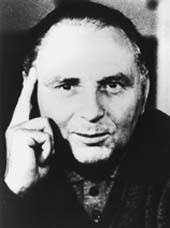 Their first film together, The Hijacking (Unos, aka Kidnapped, 1952), was explicitly anti-capitalist, but was nevertheless criticized by a Czech government for being “bourgeois-objectivistic.” It was only due to an intervention by Soviet filmmaking legend Vselovod Pudovkin that the film survived. Kadar and Klos’ next film, Music from Mars (Hudba z Marsu, 1954), was a musical comedy that received official criticism for supposedly slandering public figures. House at the Terminus (Dum na konecne, 1957) escaped offical censure, but Kadar and Klos’ Three Wishes (Tri Prani, 1958) was banned outright and the filmmakers suspended from working for two years. The two-year hiatus became five, and they didn’t make another film until 1963’s guerilla combat tale Death is Called Engelchen (Smrt si rika Engelchen). The anti-Stalinist courtroom drama The Defendant (Obzalovany, 1964) followed, but Kadar and Klos achieved international acclaim with The Shop on Main Street (Obchod na korze, 1965), the first Czechoslovak film to win an Academy Award for Best Foreign Film. On the surface, The Shop on Main Street was about the persecution of the Jews under fascism in Slovakia, but the plot ran deeper, evoking the responsibility of all Europeans for the creation and perpetuation of political oppression. Kadar and Klos went on to create Adrift/Desire is Called Anada (Touha zvana Anada, 1969), a stylistically and structurally complex story of fantasy and sexual obsession, which proved proved to be their final collaboration. Kadar immigrated to the United States in 1970, completing The Angel Levine (1970) and his final feature, Lies My Father Told Me (1976).
Their first film together, The Hijacking (Unos, aka Kidnapped, 1952), was explicitly anti-capitalist, but was nevertheless criticized by a Czech government for being “bourgeois-objectivistic.” It was only due to an intervention by Soviet filmmaking legend Vselovod Pudovkin that the film survived. Kadar and Klos’ next film, Music from Mars (Hudba z Marsu, 1954), was a musical comedy that received official criticism for supposedly slandering public figures. House at the Terminus (Dum na konecne, 1957) escaped offical censure, but Kadar and Klos’ Three Wishes (Tri Prani, 1958) was banned outright and the filmmakers suspended from working for two years. The two-year hiatus became five, and they didn’t make another film until 1963’s guerilla combat tale Death is Called Engelchen (Smrt si rika Engelchen). The anti-Stalinist courtroom drama The Defendant (Obzalovany, 1964) followed, but Kadar and Klos achieved international acclaim with The Shop on Main Street (Obchod na korze, 1965), the first Czechoslovak film to win an Academy Award for Best Foreign Film. On the surface, The Shop on Main Street was about the persecution of the Jews under fascism in Slovakia, but the plot ran deeper, evoking the responsibility of all Europeans for the creation and perpetuation of political oppression. Kadar and Klos went on to create Adrift/Desire is Called Anada (Touha zvana Anada, 1969), a stylistically and structurally complex story of fantasy and sexual obsession, which proved proved to be their final collaboration. Kadar immigrated to the United States in 1970, completing The Angel Levine (1970) and his final feature, Lies My Father Told Me (1976).
Jiri Menzel (1938 – 2020)
 Jiri Menzel graduated from FAMU in 1963. After working as an assistant to Vera Chytilova and acting for Evald Schorm, he contributed a film entitled The Death of Mr. Balthazar to Pearls of the Deep (Perlicky na dne, 1965), an anthology of shorts based on stories by Czech author Bohumil Hrabal. The Death of Mr. Balthazar (Smrt pana Baltazara) was considered by many to be the best of the five films and brought considerable attention to the director. But it was Menzel’s first feature film, Closely Watched Trains (Ostre sledovane vlaky, 1966), that afforded the director worldwide acclaim. Adapted from a Hrabal novel of the same name, Closely Watched Trains is often thought to epitomize the Czechoslovak New Wave in its artful combination of comedy, tragedy, and incisive observation of everyday life. The bittersweet WWII coming-of-age story was an international hit and was awarded the Academy Award for best foreign film in 1967. The tragicomic edge and compassionate irony of Closely Watched Trains continued through Menzel’s Capricious Summer (Rozmarne leto, 1967), and the director scored another hit in Czechoslovakia with the musical Crime in the Night Club (Zlocin v santanu, 1968). Menzel’s next film–—another Hrabal adaptation entitled Larks on a String (Skrivanci na niti, 1969)—was banned by the authorities. Menzel wasn’t allowed to produce another feature until his Seclusion Near a Forest (Na samote u lesa) in 1976. Menzel continued to direct and act in theater and film in Prague until his death in 2020.
Jiri Menzel graduated from FAMU in 1963. After working as an assistant to Vera Chytilova and acting for Evald Schorm, he contributed a film entitled The Death of Mr. Balthazar to Pearls of the Deep (Perlicky na dne, 1965), an anthology of shorts based on stories by Czech author Bohumil Hrabal. The Death of Mr. Balthazar (Smrt pana Baltazara) was considered by many to be the best of the five films and brought considerable attention to the director. But it was Menzel’s first feature film, Closely Watched Trains (Ostre sledovane vlaky, 1966), that afforded the director worldwide acclaim. Adapted from a Hrabal novel of the same name, Closely Watched Trains is often thought to epitomize the Czechoslovak New Wave in its artful combination of comedy, tragedy, and incisive observation of everyday life. The bittersweet WWII coming-of-age story was an international hit and was awarded the Academy Award for best foreign film in 1967. The tragicomic edge and compassionate irony of Closely Watched Trains continued through Menzel’s Capricious Summer (Rozmarne leto, 1967), and the director scored another hit in Czechoslovakia with the musical Crime in the Night Club (Zlocin v santanu, 1968). Menzel’s next film–—another Hrabal adaptation entitled Larks on a String (Skrivanci na niti, 1969)—was banned by the authorities. Menzel wasn’t allowed to produce another feature until his Seclusion Near a Forest (Na samote u lesa) in 1976. Menzel continued to direct and act in theater and film in Prague until his death in 2020.
Jan Nemec (1936 -2016 )
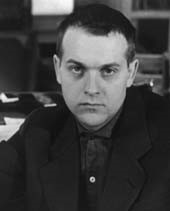 Considered the enfant terrible of the Czechsolovak New Wave, Jan Nemec has been an iconoclast and bold experimenter since his school days at FAMU. He made a striking first impression with his debut feature, Diamonds of the Night (Demanty noci, 1964), the story of two Jewish boys who escape the Nazi “death march” at the end of WWII. Diamonds of the Night had a harshly realistic foundation, yet in Nemec’s hands became a terrifying journey through the subjective experience of the boys, revealing their interior desperation and suffering through a series of hallucinations, daydreams, and nightmares. The film won several international awards and set the stage for Nemec’s next film, Report on the Party and the Guests (O slavnosti a hostech, 1966). The first in a brief yet fertile collaboration with his then-wife, designer and art director Ester Krumbachova, Report was the antithesis to Milos Forman’s realism and quotidian observation—a sinister and highly stylized Kafka-esque morality play about man’s indifference to others and his willingness to conform to dominant ideologies. It was also perhaps the most politically dangerous film of the Czechoslovak New Wave, and was promptly banned and denounced by censors. Along with Chytilova’s Daisies, Report was targeted as an excuse to condemn the entire New Wave at the Czechoslovak National Assembly in May 1967. The film eventually saw a release when Dubcek came to power in January ‘68, after the release of Nemec and Krumbachova’s surrealist tale of erotic desire Martyrs of Love (Mucednici lasky, 1967). After the Soviet occupation of Czechoslovakia, Nemec’s name was put at the head of the filmmaker blacklist. Nemec ultimately left his homeland, directing documentaries for British, West German and U.S. television throughout the late-’70s and ’80s before returning to resume his feature film career in the Czech Republic in 1989.
Considered the enfant terrible of the Czechsolovak New Wave, Jan Nemec has been an iconoclast and bold experimenter since his school days at FAMU. He made a striking first impression with his debut feature, Diamonds of the Night (Demanty noci, 1964), the story of two Jewish boys who escape the Nazi “death march” at the end of WWII. Diamonds of the Night had a harshly realistic foundation, yet in Nemec’s hands became a terrifying journey through the subjective experience of the boys, revealing their interior desperation and suffering through a series of hallucinations, daydreams, and nightmares. The film won several international awards and set the stage for Nemec’s next film, Report on the Party and the Guests (O slavnosti a hostech, 1966). The first in a brief yet fertile collaboration with his then-wife, designer and art director Ester Krumbachova, Report was the antithesis to Milos Forman’s realism and quotidian observation—a sinister and highly stylized Kafka-esque morality play about man’s indifference to others and his willingness to conform to dominant ideologies. It was also perhaps the most politically dangerous film of the Czechoslovak New Wave, and was promptly banned and denounced by censors. Along with Chytilova’s Daisies, Report was targeted as an excuse to condemn the entire New Wave at the Czechoslovak National Assembly in May 1967. The film eventually saw a release when Dubcek came to power in January ‘68, after the release of Nemec and Krumbachova’s surrealist tale of erotic desire Martyrs of Love (Mucednici lasky, 1967). After the Soviet occupation of Czechoslovakia, Nemec’s name was put at the head of the filmmaker blacklist. Nemec ultimately left his homeland, directing documentaries for British, West German and U.S. television throughout the late-’70s and ’80s before returning to resume his feature film career in the Czech Republic in 1989.
Evald Schorm (1931 – 1988)
 Often called “the conscience of the New Wave,” Evald Schorm eschewed both the formal experimentation of Jires and Chytilova and the quotidian realism of Forman and Menzel, choosing instead to direct traditional dramatic films with highly political content. Schorm graduated from FAMU in 1962 and made his first feature Courage for Every Day (Odvahu pro vsedni den, 1964). The politically incendiary tale of a young Communist organizer’s crumbling faith in the system revealed Schorm to be an uncompromising moralist unafraid of highly controversial subject matter (Ludvik Pacovsky, head of film at the Party Secretariat, was dismissed when he refused to condemn the film). Courage for Every Day was awarded the Czech Film Critics’ Prize in 1965 (Schorm was forbidden to accept) and was eventually released, but those in charge of distribution were ordered to do no publicity or advertising whatsoever, dooming the film to economic failure. Schorm’s next film, The Return of the Prodigal Son (Navrat ztraceneho syna, 1966) is thought to be his masterpiece, and one of the finest Czech films of the ’60s. It tells the story of a man whose unwillingness to compromise his moral convictions in accordance with the existing social structure lands him in a mental institution. Schorm followed Prodigal Son with the troubling Five Girls in Pursuit (Pet holek na krku, 1967), an incisive adaptation of a novel for adolescent girls, and the religious satire End of a Priest (Konec farare, 1968). The Seventh Day, The Eighth Night (Seamy den, soma no, 1969), was permanently banned by Czech authorities in 1970 and Schorm was forbidden to work in the film industry. He returned to feature filmmaking in the late-1980s, shortly before his death.
Often called “the conscience of the New Wave,” Evald Schorm eschewed both the formal experimentation of Jires and Chytilova and the quotidian realism of Forman and Menzel, choosing instead to direct traditional dramatic films with highly political content. Schorm graduated from FAMU in 1962 and made his first feature Courage for Every Day (Odvahu pro vsedni den, 1964). The politically incendiary tale of a young Communist organizer’s crumbling faith in the system revealed Schorm to be an uncompromising moralist unafraid of highly controversial subject matter (Ludvik Pacovsky, head of film at the Party Secretariat, was dismissed when he refused to condemn the film). Courage for Every Day was awarded the Czech Film Critics’ Prize in 1965 (Schorm was forbidden to accept) and was eventually released, but those in charge of distribution were ordered to do no publicity or advertising whatsoever, dooming the film to economic failure. Schorm’s next film, The Return of the Prodigal Son (Navrat ztraceneho syna, 1966) is thought to be his masterpiece, and one of the finest Czech films of the ’60s. It tells the story of a man whose unwillingness to compromise his moral convictions in accordance with the existing social structure lands him in a mental institution. Schorm followed Prodigal Son with the troubling Five Girls in Pursuit (Pet holek na krku, 1967), an incisive adaptation of a novel for adolescent girls, and the religious satire End of a Priest (Konec farare, 1968). The Seventh Day, The Eighth Night (Seamy den, soma no, 1969), was permanently banned by Czech authorities in 1970 and Schorm was forbidden to work in the film industry. He returned to feature filmmaking in the late-1980s, shortly before his death.
Stefan Uher (1930 – 1993)
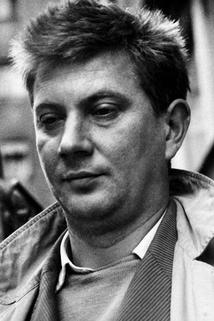 Stefan Uher’s first feature, We of 9A (My z deviatej, 1961), was an unusual film for and about children. The film was highly stylized and unconventional, but Uher’s next film—the seminal Sunshine in a Net (Slnko v sieti, 1962)—was a major advance. Often identified as the first film of the Czechoslovak New Wave, Sunshine in a Net was a wildly innovative achievement that forever altered the face of Czechoslovak cinema. In his depiction of the everyday lives of young people trying to make sense of life, Uher deviated markedly from the official socialist-realist approach, creating a structurally radical and highly subjective film that focused its attention on perennial and deeply personal issues rather than the building of a socialist society. The film was dubbed anti-socialist and banned in Bratislava, but in 1963 a group of Czech film critics arranged a gala showing in Prague and voted overwhelmingly for its artistic merit. With this critical vindication, Sunshine in a Net became emblematic of a cinematic groundswell in Czechoslovakia. Uher continued his special brand of surrealism in a series of films, including The Organ (Organ, 1963), The Miraculous Virgin (Panna zazracnica, 1966), and Three Daughters (Tri dcery, 1967). Unlike many of his contemporaries, Uher was allowed to direct films in Czechoslovakia throughout the seventies and into the eighties.
Stefan Uher’s first feature, We of 9A (My z deviatej, 1961), was an unusual film for and about children. The film was highly stylized and unconventional, but Uher’s next film—the seminal Sunshine in a Net (Slnko v sieti, 1962)—was a major advance. Often identified as the first film of the Czechoslovak New Wave, Sunshine in a Net was a wildly innovative achievement that forever altered the face of Czechoslovak cinema. In his depiction of the everyday lives of young people trying to make sense of life, Uher deviated markedly from the official socialist-realist approach, creating a structurally radical and highly subjective film that focused its attention on perennial and deeply personal issues rather than the building of a socialist society. The film was dubbed anti-socialist and banned in Bratislava, but in 1963 a group of Czech film critics arranged a gala showing in Prague and voted overwhelmingly for its artistic merit. With this critical vindication, Sunshine in a Net became emblematic of a cinematic groundswell in Czechoslovakia. Uher continued his special brand of surrealism in a series of films, including The Organ (Organ, 1963), The Miraculous Virgin (Panna zazracnica, 1966), and Three Daughters (Tri dcery, 1967). Unlike many of his contemporaries, Uher was allowed to direct films in Czechoslovakia throughout the seventies and into the eighties.
Below you will find some of the Czech New Wave genre of films mentioned in todays post.
Our personal favorites, which we have written about (and your can read more about if you click the titles below) are Limonadovy Joe and The Shop on Main Street. You may also read our other posts on Věra Chytilová and Miloš Forman.
We hope you will enjoy them!
Kytka’s Addition:
The Criterion Channel has a section on Czechoslovak New Wave. They write, “Of all the cinematic New Waves that broke over the world in the 1960s, the one in Czechoslovakia was among the most fruitful, fascinating, and radical. With a wicked sense of humor and a healthy streak of surrealism, a group of fearless directors—including Miloš Forman (THE FIREMEN’S BALL), Vera Chytilová (DAISIES), Jiří Menzel (CLOSELY WATCHED TRAINS), Jaromil Jireš (VALERIE AND HER WEEK OF WONDERS), Jan Němec (A REPORT ON THE PARTY AND GUESTS), and Juraj Herz (THE CREMATOR)—risked censorship and began to use film to speak out about the hypocrisy and absurdity of the Communist state. Ranging in style from the dazzlingly experimental to the arrestingly realistic, these revolutionary transmissions from a singular time and place stand as models of art as a tool of political resistance.”
Visit the Criterion Channel’s Czechoslovak New Wave Page.
Guest Post Author
 Prof. Barbara S. Weitz taught at FIU for 30 years and was the Director of the FIU Study Abroad Program to the Czech Republic for 22 years. Included in the program was a 2-week Czech Cinema course which included participation in the prestigious Karlovy Vary Film Festival held every summer.
Prof. Barbara S. Weitz taught at FIU for 30 years and was the Director of the FIU Study Abroad Program to the Czech Republic for 22 years. Included in the program was a 2-week Czech Cinema course which included participation in the prestigious Karlovy Vary Film Festival held every summer.
Retired, Florida International University
Director of Film Studies
Director of Czech Studies Program
Director of JCC Israeli Film Series
Read her entire profile here.
Connect with Barbara on LinkedIn or at 10 Stars.
Thank you in advance for your support…
We know that you could spend hours, days, weeks and months finding some of this information yourselves – but at this website, we curate the best of what we find for you and place it easily and conveniently into one place. Please take a moment today to recognize our efforts and make a donation towards the operational costs of this site – your support keeps the site alive and keeps us searching for the best of our heritage to bring to you.
Remember, we rely solely on your donations to keep the project going.
We appreciate you more than you know!
If you have not already subscribed to get TresBohemes.com delivered to your inbox, please use the form below now so you never miss another post.






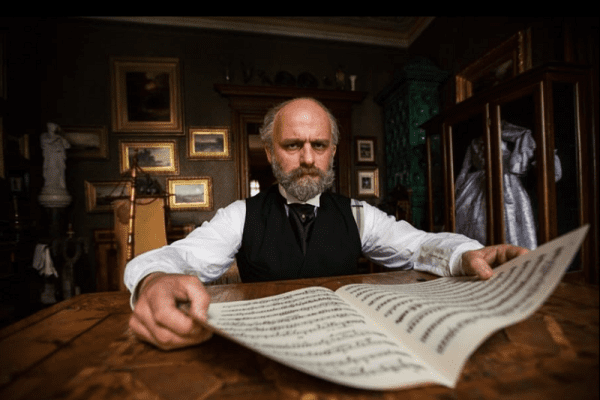















I have always been a fan of this genre. There are a few I missed and see here, so I will check them out. Also, thanks for the link to the Criterion page.
Of all the cinematic New Waves that broke over the world in the 1960s, the one in Czechoslovakia was among the most fruitful, fascinating, and radical. With a wicked sense of humor and a healthy streak of surrealism, a group of fearless directors—including eventual Oscar winners Miloš Forman and Ján Kadár—began to use film to speak out about the hypocrisy and absurdity of the Communist state. A defining work was the 1966 omnibus film Pearls of the Deep, which introduced five of the movement’s essential voices: Věra Chytilová, Jaromil Jireš, Jiří Menzel, Jan Němec, and Evald Schorm. Dazzlingly experimental, some arrestingly realistic, all singular expressions from a remarkable time and place.
My wife and I are really happy having stumbled across this site. She’s got a Czech background and it is interesting to learn about all these things. I told her we’ll have to watch some of these movies.
I love these old Czech new wave films. They seem so forward for that time and living under the regime. What a brave bunch of visionaries. They are most certainly ahead of their time.
I enjoy your posts and this good topic. Thanks for excellent info.